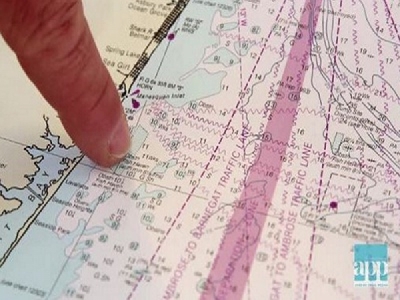
Posted on July 26, 2016
By Dan Radel, app.com
The appearance of the 123-foot offshore supply vessel Scarlett Isabella on the Manasquan Ridge is a bad omen to Capt. Jim Lovgren, a Point Pleasant Beach commercial fishermen.
The Scarlett was in the hire of the Bureau of Ocean Energy Management, which is looking for potential sand on the outer continental shelf that could be pumped up onto the Jersey beach. Tampering with these sand beds, which are long-established fishing areas, could reshape the fishing communities at the Shore, fishermen say.
The ridge, which starts to rise off the ocean floor 5 ½ miles southeast of Manasquan Inlet, is one of those potential resources of sand.
“Last year word was that Manasquan Ridge was a last resort for beach replenishment use. The fact that they are paying a survey vessel to crisscross it clearly says something different,” said Lovgren, who sits on the Executive Board of the Garden State Seafood Association.
Fishermen have been weary of a conflict with the Army Corps of Engineers over the ridge, and others nearby, which they depend on to hold fish.
They are still bitter about Army Corps’ use of nearly half of the 683-acre Harvey Cedars Lump for the Long Beach Island to Little Egg Inlet beach replenishment project.
“It’s always a bad idea to destroy a ridge. You know, the government is worried about overfishing but they have no problem destroying a fishing habitat,” said Capt. Dale Steinart, a long-time party boat captain.
The Manasquan Ridge is 1,700 acres – about 1,500 football fields – of underwater sand hills that rise about 20 feet off the bottom. There are a few scattered shipwrecks and rock ledges on it.
Baitfish called sand eels survive in its eelgrass, which in turn attract the state’s most commercially valuable finfish: summer flounder. Commercial fishermen like Lovgren tow their nets east to west, north to south to gather up the fish.
In 2014 commercial landings of summer flounder statewide netted fishermen $4.8 million on the wholesale market, according to the latest figures from the National Oceanic and Atmospheric Administration.
Flotillas of party boats have historically drifted the ridge for bluefish and mackerel.
The Army Corps has it in its sights now for sand to maintain a $5.1 million coastal dune project from Manasquan Inlet to Island Beach State Park. It said the ridge has 38.6 million cubic yards of suitable beach fill material.
“We’re not going to use it at the project start. But we are looking at it for the long term. It’s a 50-year planning project,” said Ed Voigt, a spokesman for the U.S. Army Corps of Engineers Philadelphia District.
The Army Corps identify’s the Manasquan Ridge as “Borrow Area F2.” After initial construction of the on-shore berms, it wants to replenish the beach every four years with 961,000 cubic yards of sand. That would total about 12 million cubic yards, or a third of the ridge, over the 50-year span of work. Giant Stadium, for example, can hold 64 million cubic yards from top to bottom.
It said there are no economically viable land sources of sand for the large quantities needed for these projects. The ridge’s sand is also the right grain texture, the corps said.
The Army Corps would need the Bureau of Ocean Energy’s permission to vacuum it up because that agency has jurisdiction over sand in federal waters, typically 3 to 200 nautical miles from the shoreline.
To this point they haven’t asked for permission, said Marjorie Weisskohl, BOEM spokesperson.
The project — long bogged down on land as the state Department of Environmental Protection collected easements from seaside property owners — could go out to bid in September and begin as early as next spring season, Voigt said.
It still faces holdouts in the towns of Point Pleasant Beach, Bay Head, part of Mantoloking and Berkeley. Those areas will not get fill at the start of the project, said Voigt.
The DEP remains adamant about getting this coastal project completed after the devastation caused by Sandy almost four years ago.
“What’s at stake is protection of lives, homes, businesses and infrastructure, as well as many thousands of jobs and billions of dollars in tourism revenues,” said Larry Hajna, a DEP spokesperson.
Fishermen, however, say that removing the sand could have unintended consequences.
“To take away some of this is going to change the ecosystem of the area that’s there,” said Capt. William Egerter Jr. skipper of the party boat Dauntless.
Source: app.com





